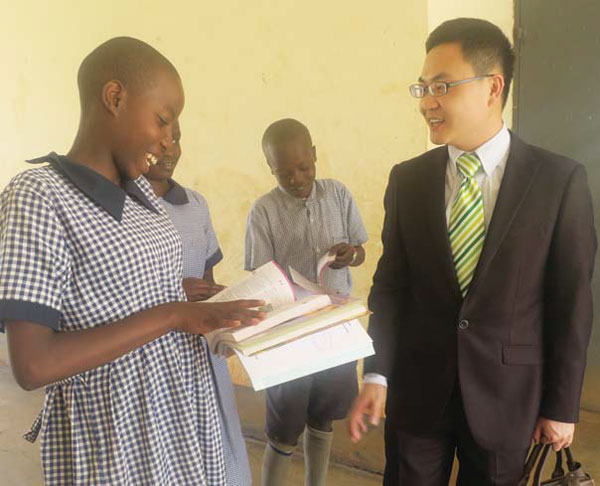Chinese NGO takes books to needy children
Aid is welcomed by Kenyans as new reading materials fill an educational gap
A Chinese nongovernmental organization focusing on youth empowerment is building miniature libraries in Africa in a move to help elementary schools in low-income areas.
The project, which involves infrastructure valued at more than $5 million, is supporting the education needs of hundreds of children in five countries - Kenya, Tanzania, Rwanda, Burundi and Namibia.
Known as Project Hope for Africa, the initiative by China Youth Development Foundation (CYDF) is complementing governmental efforts to provide textbooks and other learning materials to schools. The policies have, however, faced funding challenges. According to UNESCO, most pupils in Africa suffer from a lack of reading materials.
|
Xu Zhibing, executive at China Youth Development Foundation, with students at Kibii Primary School in Thika, Kenya. The school has received 5,340 books and shelves from the Chinese NGO. Lucie Morangi / China Daily |
In Kenya, the ratio of textbooks to pupils is one book for every three children, according to the government.
"The shortage is due to limited resources and the high cost of books. It is therefore hard to replace old and worn-out books frequently while providing for every student," says Habat Sheikh Abdi, director of basic education for Kenya's Ministry of Education.
He says the initiative by the Chinese organization will go a long way toward improving educational infrastructure and literacy levels, especially at institutions located in low-income neighborhoods where parents face difficulties in contributing sufficiently to the development needs of the institution.
"We are not taking this initiative for granted," he says.
The NGO has so far developed 10 schools in Kenya and furnished each with 5,340 books, together with bookshelves. Funded by TOJOY Group, the foundation aims to equip children with books to boost their chances of contributing effectively to national development.
"The China-Africa partnership is premised on improving people's livelihoods. Education is the most sustainable way of alleviating poverty," says Xu Zhibing, an executive at CYDF.
He says the organization aligns its strategies with government programs to ensure seamless and effective results.
"We would like to see that each African child has an equal opportunity to improve their future by improving their learning environment," he says.
Kibii primary school, about 42 kilometers east of the capital city of Nairobi, is one of the beneficiaries. With a gleaming new building completed three years ago, the school was ecstatic to receive the books. There are 436 students, most of them hailing from a nearby slum area.
According to the headmaster, the learning resources are crucial in building the students' confidence and competence.
"What we have available cannot meet our needs. The donation by CYDF will definitely go a long way," says Michael Ngugi, who has headed the school for the last four years.
He affirms that the new building has not only improved the school learning environment and synergy among teachers but has also attracted donations from other well-wishers.
"Parents are also happy to bring their children here," he says.
He notes that some of the learning materials are in digital form, which conforms with the government's recent policy of using laptops. The Digital Learning program was rolled out by the government four years ago. It aims at integrating the use of digital technologies in schools.
Xu, who has been working with the Chinese foundation for five years, says learning materials are purchased locally.
"We are looking forward to closely collaborating with the publishers as the new curriculum in Kenya - which includes the introduction of the Chinese language - rolls out soon," he says.
Started in 1989 by the All China Youth Federation, Project Hope was launched soon after. As of 2013, it had cumulatively raised $1.4 billion, aided over 4.9 million financially challenged rural students and built 18,335 Hope primary schools and about 20,604 miniature libraries. In Africa, its projects started in 2011 in Tanzania.
According to Xu, the foundation plans to scale up the project to Zambia and Ethiopia in the next two months.
lucymorangi@chinadaily.com.cn





















